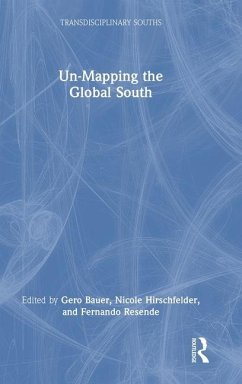Un-Mapping the Global South
Herausgeber: Bauer, Gero; Resende, Fernando; Hirschfelder, Nicole
Un-Mapping the Global South
Herausgeber: Bauer, Gero; Resende, Fernando; Hirschfelder, Nicole
- Gebundenes Buch
- Merkliste
- Auf die Merkliste
- Bewerten Bewerten
- Teilen
- Produkt teilen
- Produkterinnerung
- Produkterinnerung
This book offers new approaches and insights into the ongoing and topical discussions on the concepts and definitions of the global south.
Andere Kunden interessierten sich auch für
![Mapping The Faerie Queene Mapping The Faerie Queene]() Wayne EricksonMapping The Faerie Queene180,99 €
Wayne EricksonMapping The Faerie Queene180,99 €![Before the Trenches Before the Trenches]() Ricardo NamoraBefore the Trenches50,85 €
Ricardo NamoraBefore the Trenches50,85 €![Mapping South American Latina/o Literature in the United States Mapping South American Latina/o Literature in the United States]() Juanita HerediaMapping South American Latina/o Literature in the United States67,99 €
Juanita HerediaMapping South American Latina/o Literature in the United States67,99 €![Mapping Literary Modernism Mapping Literary Modernism]() Ricardo J. QuinonesMapping Literary Modernism96,99 €
Ricardo J. QuinonesMapping Literary Modernism96,99 €![Mapping South American Latina/o Literature in the United States Mapping South American Latina/o Literature in the United States]() Juanita HerediaMapping South American Latina/o Literature in the United States49,99 €
Juanita HerediaMapping South American Latina/o Literature in the United States49,99 €![Mapping the Research Landscape of Interpreter and Translator Education Mapping the Research Landscape of Interpreter and Translator Education]() Xiangdong LiMapping the Research Landscape of Interpreter and Translator Education186,99 €
Xiangdong LiMapping the Research Landscape of Interpreter and Translator Education186,99 €![In the Presence of the Future In the Presence of the Future]() Georg SchmidIn the Presence of the Future109,85 €
Georg SchmidIn the Presence of the Future109,85 €-
-
-
This book offers new approaches and insights into the ongoing and topical discussions on the concepts and definitions of the global south.
Hinweis: Dieser Artikel kann nur an eine deutsche Lieferadresse ausgeliefert werden.
Hinweis: Dieser Artikel kann nur an eine deutsche Lieferadresse ausgeliefert werden.
Produktdetails
- Produktdetails
- Verlag: Routledge India
- Seitenzahl: 308
- Erscheinungstermin: 19. März 2024
- Englisch
- Abmessung: 240mm x 161mm x 21mm
- Gewicht: 628g
- ISBN-13: 9781032607986
- ISBN-10: 103260798X
- Artikelnr.: 69483320
- Herstellerkennzeichnung
- Libri GmbH
- Europaallee 1
- 36244 Bad Hersfeld
- gpsr@libri.de
- Verlag: Routledge India
- Seitenzahl: 308
- Erscheinungstermin: 19. März 2024
- Englisch
- Abmessung: 240mm x 161mm x 21mm
- Gewicht: 628g
- ISBN-13: 9781032607986
- ISBN-10: 103260798X
- Artikelnr.: 69483320
- Herstellerkennzeichnung
- Libri GmbH
- Europaallee 1
- 36244 Bad Hersfeld
- gpsr@libri.de
Gero Bauer teaches English Literature and Cultural Studies at the University of Tübingen and is the managing director of Tübingen's Center for Gender and Diversity Research. Nicole Hirschfelder teaches and researches North-American literary and cultural studies at the University of Tübingen. Fernando Resende is Senior Lecturer and Research Coordinator at the Department of Media and Cultural Studies and at the Graduate Program in Communication at Universidade Federal Fluminense and the coordinator of TRAVESSIA - Centre for Global South Studies and Researches. PQ/CNPq Grant Resarcher.
1. Introduction I. Regimes of Subjectivities and Power Relations:
(Re)Presenting Space 2. Alternative Cartographies of Mexico: Violence,
Hope, and Future 3. Talking History: Ethnographic Interviews,
Intersectional Identities, and Power Negotiations in Research Encounters
4. Class Divides and Poverty in the Postcolonial Graphic Novel: A Reading
of Sarnath Banerjee's The Harappa Files (2011) 5. (Dis)Orientation Matters:
On the Man Who Walked a Spiral and Other Tales of Breaking with Colonial
Mobility II. Glocalising the South: Bodies and Territories 6. The South as
a Moving Ground: Images, Subjectivities and a Black Sense of Space 7. Who
May Speak on Whose Behalf: Queer Representation in India 8. 'Going
Global?!' - Black Lives Matter, the 'Global South' and the Issue of
'Worldmaking' 9. The Poetical and the Political: Walking Across Boundaries
with The Kabir Project 10. Decolonising the Brazilian Musical Scene: Race,
Gender, and Sexuality III. Dystopian Spaces/Utopian Spaces: Inventing
Futures 11. Unmasking a Cryptic-South: The Spatial Emergence of the
'Abhuman' 12. Performing Resilience: The Trope of the Theatre in Frank
McGuinness's Carthaginians and Derek Walcott's A Branch of the Blue Nile
13. Homing Change: Soul City as Re-Filiation 14. The Invention of Joyful
Black Territories: Body, Style, and Music in Contemporary 'Black Parties'
in Brazil 15. They Yelled Me Aberration: Inexistentialism and Fugitivity
16. Fabulations from the South: Speculating with Brazilian Black Cinema
(Re)Presenting Space 2. Alternative Cartographies of Mexico: Violence,
Hope, and Future 3. Talking History: Ethnographic Interviews,
Intersectional Identities, and Power Negotiations in Research Encounters
4. Class Divides and Poverty in the Postcolonial Graphic Novel: A Reading
of Sarnath Banerjee's The Harappa Files (2011) 5. (Dis)Orientation Matters:
On the Man Who Walked a Spiral and Other Tales of Breaking with Colonial
Mobility II. Glocalising the South: Bodies and Territories 6. The South as
a Moving Ground: Images, Subjectivities and a Black Sense of Space 7. Who
May Speak on Whose Behalf: Queer Representation in India 8. 'Going
Global?!' - Black Lives Matter, the 'Global South' and the Issue of
'Worldmaking' 9. The Poetical and the Political: Walking Across Boundaries
with The Kabir Project 10. Decolonising the Brazilian Musical Scene: Race,
Gender, and Sexuality III. Dystopian Spaces/Utopian Spaces: Inventing
Futures 11. Unmasking a Cryptic-South: The Spatial Emergence of the
'Abhuman' 12. Performing Resilience: The Trope of the Theatre in Frank
McGuinness's Carthaginians and Derek Walcott's A Branch of the Blue Nile
13. Homing Change: Soul City as Re-Filiation 14. The Invention of Joyful
Black Territories: Body, Style, and Music in Contemporary 'Black Parties'
in Brazil 15. They Yelled Me Aberration: Inexistentialism and Fugitivity
16. Fabulations from the South: Speculating with Brazilian Black Cinema
1. Introduction I. Regimes of Subjectivities and Power Relations:
(Re)Presenting Space 2. Alternative Cartographies of Mexico: Violence,
Hope, and Future 3. Talking History: Ethnographic Interviews,
Intersectional Identities, and Power Negotiations in Research Encounters
4. Class Divides and Poverty in the Postcolonial Graphic Novel: A Reading
of Sarnath Banerjee's The Harappa Files (2011) 5. (Dis)Orientation Matters:
On the Man Who Walked a Spiral and Other Tales of Breaking with Colonial
Mobility II. Glocalising the South: Bodies and Territories 6. The South as
a Moving Ground: Images, Subjectivities and a Black Sense of Space 7. Who
May Speak on Whose Behalf: Queer Representation in India 8. 'Going
Global?!' - Black Lives Matter, the 'Global South' and the Issue of
'Worldmaking' 9. The Poetical and the Political: Walking Across Boundaries
with The Kabir Project 10. Decolonising the Brazilian Musical Scene: Race,
Gender, and Sexuality III. Dystopian Spaces/Utopian Spaces: Inventing
Futures 11. Unmasking a Cryptic-South: The Spatial Emergence of the
'Abhuman' 12. Performing Resilience: The Trope of the Theatre in Frank
McGuinness's Carthaginians and Derek Walcott's A Branch of the Blue Nile
13. Homing Change: Soul City as Re-Filiation 14. The Invention of Joyful
Black Territories: Body, Style, and Music in Contemporary 'Black Parties'
in Brazil 15. They Yelled Me Aberration: Inexistentialism and Fugitivity
16. Fabulations from the South: Speculating with Brazilian Black Cinema
(Re)Presenting Space 2. Alternative Cartographies of Mexico: Violence,
Hope, and Future 3. Talking History: Ethnographic Interviews,
Intersectional Identities, and Power Negotiations in Research Encounters
4. Class Divides and Poverty in the Postcolonial Graphic Novel: A Reading
of Sarnath Banerjee's The Harappa Files (2011) 5. (Dis)Orientation Matters:
On the Man Who Walked a Spiral and Other Tales of Breaking with Colonial
Mobility II. Glocalising the South: Bodies and Territories 6. The South as
a Moving Ground: Images, Subjectivities and a Black Sense of Space 7. Who
May Speak on Whose Behalf: Queer Representation in India 8. 'Going
Global?!' - Black Lives Matter, the 'Global South' and the Issue of
'Worldmaking' 9. The Poetical and the Political: Walking Across Boundaries
with The Kabir Project 10. Decolonising the Brazilian Musical Scene: Race,
Gender, and Sexuality III. Dystopian Spaces/Utopian Spaces: Inventing
Futures 11. Unmasking a Cryptic-South: The Spatial Emergence of the
'Abhuman' 12. Performing Resilience: The Trope of the Theatre in Frank
McGuinness's Carthaginians and Derek Walcott's A Branch of the Blue Nile
13. Homing Change: Soul City as Re-Filiation 14. The Invention of Joyful
Black Territories: Body, Style, and Music in Contemporary 'Black Parties'
in Brazil 15. They Yelled Me Aberration: Inexistentialism and Fugitivity
16. Fabulations from the South: Speculating with Brazilian Black Cinema









